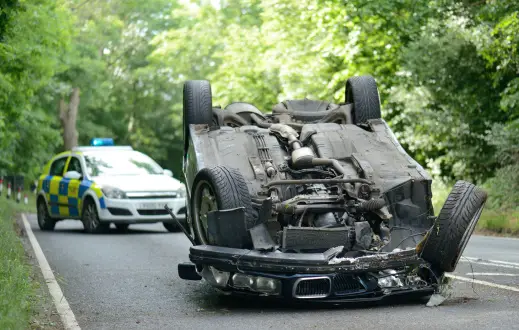
On Canadian highways, rollover accidents — in which a car turns onto its side or roof — are very dangerous. Serious injuries, deaths, and substantial property damage can result from these collisions. If you’ve been in a rollover, you need to know what causes them and how culpability is decided in Canada.
Common Causes of Rollover Accidents
A rollover accident can be caused by several things. These are a few of the most typical ones:
- Speeding: Going above the speed limit poses a significant risk, particularly on highways with bends or uneven surfaces. Elevated velocity complicates control and raises the possibility of a car overturning.
- Sharp Turns: A car that is driven too fast may lose traction and roll. This is particularly valid for trucks and SUVs, which have a high center of gravity.
- Shifting Cargo: During transportation, improperly fastened cargo in a truck or trailer may move, affecting the weight distribution and stability of the vehicle. This can result in a rollover, especially while braking or turning quickly.
- Distracted Driving: Any activity that takes your focus away from the road, such as texting, using a navigation system, or chatting on the phone, increases the risk of losing control and rolling over.
- Driving While Intoxicated: Alcohol and drugs decrease judgment and response time, which raises the possibility of collisions, especially rollovers, dramatically.
- Vehicle Malfunction: Rollovers can also be caused by mechanical faults including tire blowouts, malfunctioning brakes, or suspension problems.
- Road Conditions: Uneven pavement, potholes, and debris are examples of poor road care that can make a car swerve or lose control, raising the possibility of a rollover.
Identifying Who is Responsible for Rollover Accidents
In Canada, the negligence principle governs who is responsible for auto accidents. This means that the person whose negligence or other conduct resulted in the collision has financial liability for the injuries sustained. Depending on the details of the rollover accident, many parties may be held accountable:
- The Driver: The driver will probably be held accountable if their actions — such as speeding, texting while driving, or operating a vehicle while intoxicated — caused the rollover.
- Another Driver: If the rollover was brought on by the carelessness of another driver, such as forcing a lane change or driving aggressively, that driver may be held liable.
- Cargo Truck Driver: The truck driver or the trucking firm may be held accountable if the rollover was caused by incorrect cargo loading in the vehicle.
- Car Manufacturer: Rarely, a flaw in the car, such as a malfunctioning suspension system, may have caused the rollover. At that point, the maker may be held accountable.
- Government Agency: A government organization in charge of maintaining the roads may be held partially accountable if inadequate maintenance contributed to the collision.
What to Do After a Car Accident
Now let’s understand what to do after a car accident. The following are vital actions to do in the event of a multi-vehicle accident:
- Seek Medical Attention: The most important thing is your health. See a doctor to rule out any potential injuries, even if you don’t feel any pain right away.
- Speak with the Police: Get a copy of the police report and report the accident to the authorities. This paperwork is essential for any legal actions or insurance claims.
- Record the Situation: Take photos of the accident scene, the damage to your car, any injuries you may have had, and the surrounding area if you can.
- Information Sharing: Obtain contact information from drivers, passengers, and any bystanders who may have witnessed the incident.
- Never Talk About Fault: Refrain from taking credit at the scene. Remain true to the events as they transpired.
- Speak with Your Insurance Provider: Inform your insurance provider of the mishap as soon as you can. Participate in their inquiry, but don’t sign any papers without first getting legal advice.
- Speak with a Highway Traffic Lawyer: You can get legal advice on your rights and alternatives from a legal professional who specializes in vehicle accident cases. To make sure you get just recompense for your injuries, missed pay, and car damage, they can assist you in navigating car accident claims and possible litigation.
Handling Auto Insurance Claims Following a Rollover
Rollover incidents may give rise to intricate legal issues. A highway traffic lawyer can help you in several ways.
- Investigating the Accident: To find out what caused the accident and who is at fault, they will collect evidence.
- Calculating Damages: To ascertain the proper compensation, your lawyer will evaluate the severity of your injuries, lost income, and car damage.
- Negotiating with Insurance Companies: Insurance companies frequently attempt to reduce compensation through negotiation. To guarantee that you get a just settlement, your lawyer can engage in negotiations on your behalf.
- Filing a Lawsuit: Your lawyer may be able to defend you in court if a just settlement cannot be negotiated with the insurance company.
Knowing what causes rollovers and how responsibility is established in Canada gives you the option to get fair compensation following a terrifying disaster. Want to get legal insights? Subscribe to LawVo.
Back to blogs